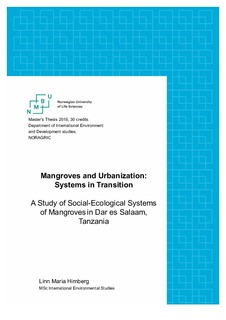| dc.description.abstract | Mangrove ecosystems are highly productive ecosystems along the coast of tropical countries. The system provides a range of ecosystem services that are valuable for human societies. While most African countries are lacking legislations to prevent mangroves, Tanzania’s mangroves have been protected by legal measures since 1928. However, degradation of the ecosystem has continued, largely due to land change and urban development. The greatest loss of mangroves in Tanzania have been in Dar es Salaam, which is also where the highest rate of urbanization is occurring. This study examines how the social-ecological systems of mangroves in Dar es Salaam are affected by urbanization and what the challenges and possibilities for a resilient system are. The resilience and vulnerability of social-ecological systems of two mangroves in Dar es Salaam; the urban mangrove system in Msimbazi valley and the peri-urban mangroves in Kunduchi. Data was collected through qualitative semi-structured interviews with residents, local government, CBO-members, businesses and governmental institutions. Additional data was obtained from observations and interpretation of satellite images. The conceptual framework guiding this study was the complementary concepts of resilience and vulnerability. Key drivers of change deriving from an urbanized environment are identified and the concept of vulnerability is valuable in assessing underlying causes of dynamic pressures. This study found that while there are benefits deriving from urbanization such as lower levels of dependency, new stressors have occured that diminish these positive effects on SES of urban mangroves in Dar es Salaam. The growing population is putting pressure on the current infrastructure which has created disastrous floods in Msimbazi valley and affected both the mangroves and the society. Kunduchi mangroves are still growing and while the management system is detracting from social and ecological resilience, opportunities exist that can potentially enhance the resilience. The SES ability to cope with stressors from urbanization can be improved by fostering participation of the local community, developing viable livelihood alternatives, enforcing current regulations and improving the communication between sub-units involved in management. | nb_NO |
